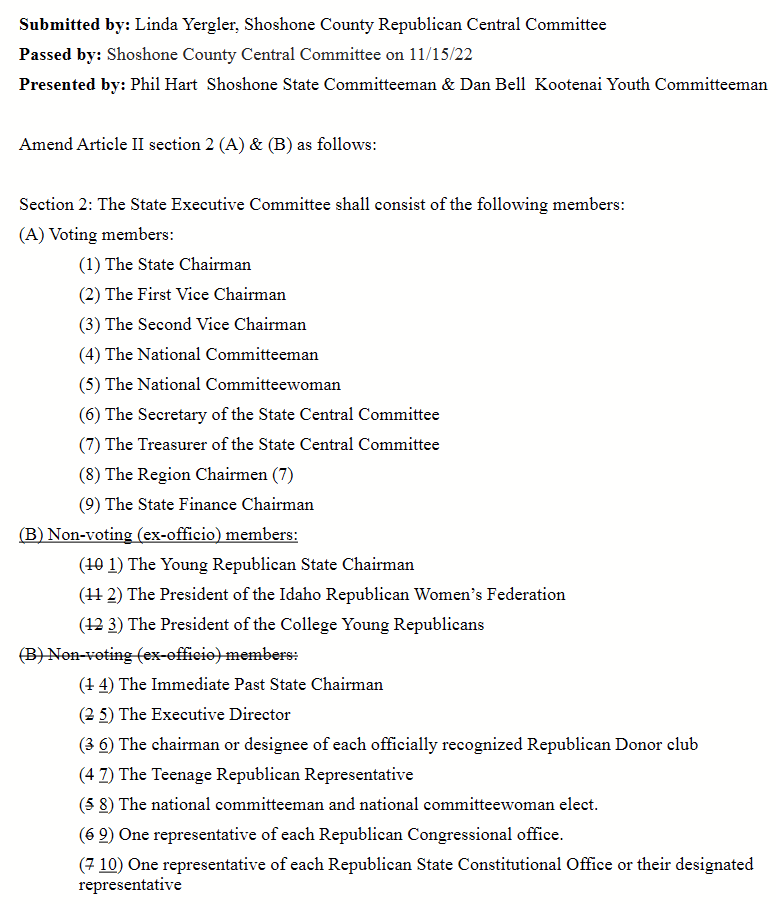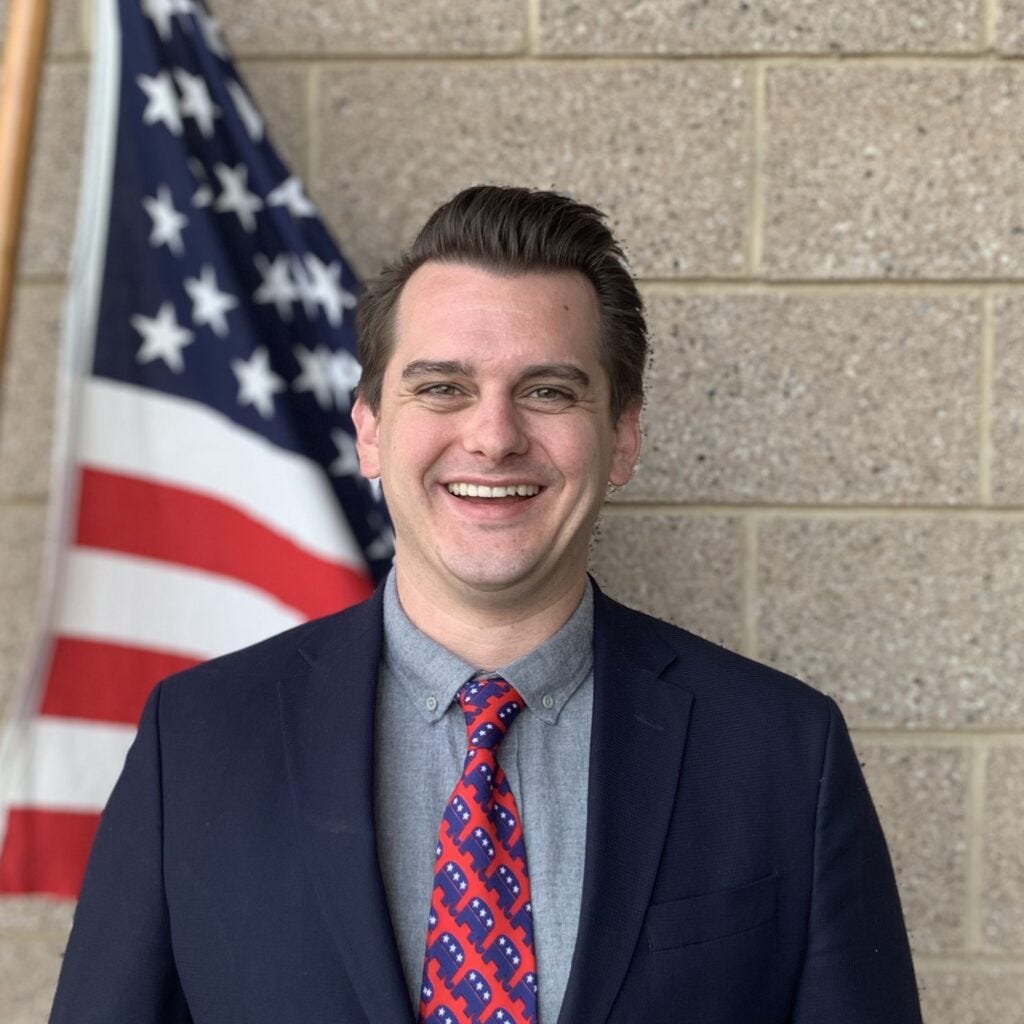Republican Representation — Controversy Over The Makeup of the GOP Executive Board Reveals Deeper Issues
One of the proposed rule changes to be deliberated at the 2023 Idaho Republican Party winter meeting would remove voting rights from the representatives of three quasi-private clubs that currently sit on the Executive Board of the State Central Committee. As it stands now, the Idaho Federation of Republican Women, the Idaho Federation of College Republicans, and the Idaho Federation of Young Republicans each send their chairs to the Executive Board, and those chairs have the same voting rights as the officers elected by the delegates to the State Convention and the chairs of the seven regional committees.
Should the leaders of these clubs, each of whom are independent of the Idaho GOP as a whole, have that level of representation? Your answer might depend on where you fall in the ongoing debate over the nature of the state party.
The Shoshone County Republican Central Committee submitted a rule change that would strip these three members of their voting rights on the Executive Board. The Central Committee will debate this motion at the winter meeting next month.
This proposal picked up steam after the special meeting of the Judicial Committee earlier in December. As that committee, which is the Executive Board minus the Chair, deliberated the merits and propriety of an investigation into the residency of National Committeeman Damond Watkins, some people began asking why the leaders of private clubs should be able to vote on such matters.
The Idaho Young Republicans have taken the lead in defending the status quo, circulating a petition called Preserve Our Vote 2023 in which they claim that the Young Republicans and College Republicans are the volunteer base of the party. They ask for signatures demanding the Central Committee reject the proposed rule change.
Supporters of the rule change have circulated their own petition called Preserve Our Party 2023, in which they claim that most states do not allow such clubs to have voting rights on their executive boards. They ask for signatures demanding the Central Committee approve the proposed rule change.
In general, I lean on Chesteron’s Fence when examining issues like this. The Christian philosopher G.K. Chesterton explained that if you come across a fence in the middle of the woods, it behooves you to figure out why it was placed their in the first place before removing it. Before we can discuss removing the voting rights of these clubs, we should endeavor to understand why they were granted in the first place. Before we can do that, we must explore the structure of the state party itself.
The Republican Party is built from the ground up. The body of the party consists of every voter in Idaho who has chosen to affiliate with the GOP. These Republican voters elect precinct committeemen to organize on their behalf. These PCs are then organized into district and county committees that conduct business to support district and county elected officials, respectively. Each committee elects its own officers. District chairs represent their PCs on the regional committees - Idaho has seven of these - and the region chairs sit on the State Central Committee. The county committees select three representatives to sit on the State Central Committee as well.
As mentioned above, the leadership of the State Central Committee is elected by delegates to the convention, which are selected every two years by the district and county committees. Most officers are elected at each convention, while the National Committeeman and National Committeewoman are elected every four. The officers, region chairs, and chairs of the three clubs mentioned above comprise the Executive Board of the State Central Committee.
The State Central Committee decides the ultimate direction of the Idaho Republican Party. They ratify resolutions and rule changes as well as interacting with the statewide elected officials. The state party issues a new platform every two years that lays out the principles we expect our candidates to uphold. The Executive Board of the Idaho GOP therefore has a lot of influence over the direction of the party.
Jacob Miller, current Chairman of the Idaho Young Republicans, was quoted in the Idaho Capital Sun explaining that the IYR was given a vote on the Executive Board in the 1970s as part of a movement to get more young people involved in politics. Miller told the Capital Sun that:
“That was basically an acknowledgement that the youth vote was important,” he said. “Young Republicans are the sole vote that represents the voice of the youth. If you look across campaign staffs or some of the boots on the ground, the Young Republicans are the ones that folks call when they need someone to knock doors or make calls or distribute campaign signs.”
According to longtime Republican activist and Young Republicans Region IV Youth Chair Jacob Cluff, the three organizations deserve their seats at the table because of their special roles within the party. Speaking specifically of the Young Republicans, Cluff tweeted, “YRs do a lot of work and organization for the IDGOP, and taking away their vote on the board will not allow them to voice opinions and positions on items they must carry out.”
I recently received an email signed by the “Idaho Young Republicans Executive Board” in which they implored me to fight to save Idaho Young Republicans’ vote:
It was the YRs that helped dozens of counties develop a website and digital communications tools. It was the YRs that helped lead the integration of new data tools into the state party. It was YRs who helped fund the travel costs for many county youth chairs to attend statewide meetings when their own county could not afford to do so. It was the YRs that helped set up and tear down countless Lincoln Day events. It was the YR’s tools that helped county auctions raise more money. It was our website that helped Republican candidates recruit more volunteers. It was the YRs that hosted multiple legislative town halls during the session, as well as a statewide candidate forum during the primary election. Going into 2023, there are more YRs elected to local and statewide offices than before.
The members of our organizations make up a huge portion of our party’s volunteer base. In our case, Young Republicans and College Republicans are the largest and fastest-growing portion of Idaho’s electorate and yet a segment that Republicans perennially struggle to engage and connect with.
Young voters (18-40) will make up over 54% of the electorate in the next election. Today, about 70% of that age group prefers to affiliate with the Democrat Party. Groups like Young Republicans and College Republicans are absolutely critical to the ground game on college campuses, churches, and in our communities. Due to our persistent efforts, Idaho is bucking the national trend when it comes to young voters’ political engagement.
I am not in a position to evaluate the veracity of any of these claims, though I have heard others cast doubt. For instance, Jacob Miller was previously on staff with the Idaho Republican Party, and would have been involved with developing websites, utilizing voter data, coordinating volunteers, and more. How much of that was done under the aegis of the state party versus the IYR is an open question.
For the sake of argument I will take the claims of the IYR on their word, because even if true, I am not convinced that they justify having a seat at the executive table. There are many great people and organizations that do the work of electing Republicans in this state, but they do not have the same level of representation. While I do not doubt that these three groups do yeoman’s work in registering voters and spreading the Republican message, I am not sure they merit essentially coequal status with the party itself. One could argue that private clubs having seats on the executive board dilutes the representation of the party rank and file.
My biggest issue with the status quo, however, is that elevating the Young Republicans, College Republicans, and Republican Women to executive-level influence smacks of the very identity politics that conservatives generally claim to disdain.
Do young Republicans really need a special organization with executive voting rights in order to be involved? There is nothing stopping an 18-year-old activist from volunteering or serving as a PC or delegate in the regular party. Indeed, many IYR members are also PCs! If I were to become a member of the IYR (anyone aged 18-40 is eligible, so I have one more year, strangely enough) then I would have extra representation at the executive level, over and above the citizens and PCs who are not members of the organization.
Why do Republican women get double representation as well? It is obviously not a necessity to ensure female representation - our State Chair is a woman, after all. There are no barriers to women when it comes to becoming delegates or PCs, so why is a separate executive-level organization necessary?
Ryan Spoon, who has done tremendous volunteer work on behalf of Republican candidates despite not being part of an organized club, brought up the question of identity politics on Twitter: “Explain to me why YOUNG Republicans should get an extra vote above and beyond all other Republicans? Do we have a special seat for male Republicans? Old Republicans? Orange Republicans?”
It is already strange to me that the Republican Party at the state and national level has separate offices for committeeman and committeewoman. Ironically, if they were to do away with the separate positions it would likely be men whose representation would decrease. In any case, I dislike identity politics whether it is practiced by Democrats or Republicans, so to me that is the most compelling argument for the proposed rule change, along with the fact that these clubs are not representative of the party as a whole.
On Twitter, Jacob Cluff argued that the Executive Board has little leeway in determining policy, rather it “does the work of the party, organizes activities, and gives updates on the happenings of the party. That is it—no crazy powers.”
If this is the case - and the state party bylaws indicate that it is - then it raises the question as to why the three organizations are fighting so hard against an attempt to remove their voting rights on the Executive Board. The petition circulated by the IYR says that a yes vote on the new rule would be catastrophic: “This would result in our members, and the future leaders of our country, not having any input into the direction of our party. This cannot happen!” This seems needlessly hyperbolic, considering the role of the Executive Board as established above as well as the ability of the future leaders of our country to get involved as PCs and volunteers.
Returning to Jacob Cluff once more (and I want to say I have appreciated his willingness to engage in frank debate on this issue), he seemed to agree that it might be a good idea to remove the club leaders from the Judicial Committee while allowing them to retain their positions on the full Executive Board. This is an interesting idea that might satisfy both sides, considering the controversy generated by the special meeting of that committee a month ago.
In the end, the fault lines over this proposal are the same ones we see time and again in state politics. Much of the so-called establishment wants to keep the status quo… because the leaders of the clubs tend to lean toward the establishment. Meanwhile, much of the so-called liberty wing supports this change for precisely the same reason. These tactical concerns represent the elephant in the room, as debaters on both sides go out of their way to avoid mentioning them.
Cluff pointed out on Twitter that changes based on power politics have a tendency to come back and bite you, and I agree. That is why I believe this issue should be debated from a moral and practical level, not necessarily a tactical one. The question at hand, then, is should the leaders of quasi-private clubs have automatic seats on the Idaho GOP State Executive Board? After hearing both sides, I believe that change is needed.
There are two possible outcomes to this controversy:
The rule change is rejected, and the three clubs continue to hold voting seats on the Executive Board, and by extension, the Judicial Committee.
The rule change is accepted, and the leaders of the three clubs become ex oficio members of the Executive Board, taking part in discussions but not actually voting.
Neither outcome will satisfy everyone, so I wonder if some sort of compromise might be reached down the line; perhaps Cluff’s suggestion that the three clubs retain their seats on the Executive Board but not the Judicial Committee; perhaps open up representation to other conservative clubs in Idaho; perhaps give private clubs representation in the Central Committee, but not the Executive Board.
I’m just spitballing here, but I hope that people on all sides are willing to discuss some sort of arrangement that would make everyone feel represented. We all claim to be working in support of the platform and for the cause of freedom in Idaho, so we should be able to find common ground.
Chesterton’s Fence is an important heuristic for evaluating any situation, but we must also be careful not to continue a process simply because it has always been done that way. An agile organization, built from the bottom up like the Idaho GOP is supposed to be, should always be examining itself to make sure it is doing a good job of representing the people and promoting the platform. This proposed rule change provides an excellent opportunity to do just that.
Brian Almon
A descendant of American pioneers, Brian writes about the importance of culture and about current events in the context of history.









